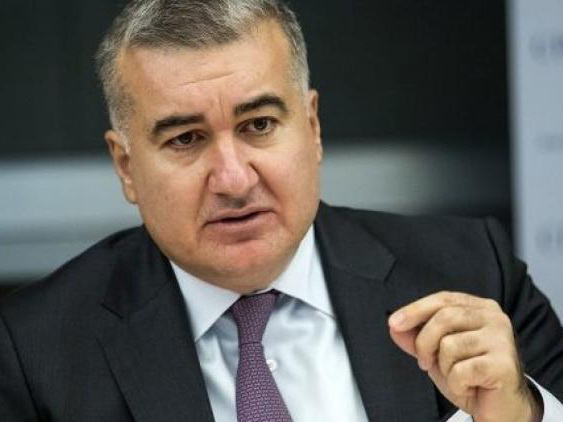Pandemic highlights the protracted Azerbaijan-Armenia conflict in Nagorno-Karabakh

By Elin Suleymanov - Tuesday, May 19, 2020
ANALYSIS/OPINION:
Sweeping through the globe, the COVID-19 pandemic attacked people’s health and damaged national economies; on a deeper level, as stated by Edward Luttwak, once described as “Machiavelli of Maryland,” the pandemic broke some convenient stereotypes about international institutions and politics.
Whether it is the questions about wisdom of depending on a single supplier, or the strong belief in European institutions, or, perhaps, a renewed interest in prudence of common-sense dietary choices, the status quo around the world is changing.
In the greater Caspian area, a regional organization, the Turkic Council, which brings together nations of Central Asia, Azerbaijan and Turkey — and, most recently, Hungary — has emerged as an effective cooperative format.
The group was especially successful in providing mutual assistance and significantly increasing the volume of rail cargo along the Silk Road between Asia and Europe, the main artery connecting the Turkic Council nations and an important part of the recently adopted U.S. Central Asia strategy. Notably, the Turkic Council, under current chairmanship of Azerbaijan, became the first ever international organization to hold a head-of-state level online summit to address the challenge of COVID-19.
Importantly, Azerbaijan, along with other partner nations, is pursuing governance reforms by bringing new technocratic, result-oriented leaders to key positions in the government and promoting greater political pluralism. In fact, President Trump stated his strong support for Azerbaijan’s sovereignty and independence in the congratulatory letter to President Ilham Aliyev this month.
The pandemic also highlighted the region’s weaknesses and perils, including the protracted Armenia-Azerbaijan conflict. The Organization for Security and Cooperation’s (OSCE) Minsk Group co-chaired by France, Russia and the United States has been mediating the negotiations for three decades with no visible progress. During the pandemic, the mediators held a video conference with foreign ministers of Armenia and Azerbaijan, and even adopted a joint statement.
Yet, with the world changing around the South Caucasus, Armenia seems to stick with the unsustainable and dangerous status-quo. Armenia’s Foreign Minister Zohrab Mnatzakanyan denounced the so-called Madrid Principles, which were endorsed by the presidents of France, Russia and the United States in 2009 and include main principles of a future peace agreement. While, Mr. Mnatzakanyan’s denunciation was later reiterated by various Armenian officials, the confusing part is what exactly he’s been actively negotiating for the last two years if not the principles he so suddenly dislikes?
The principles include, among other elements, gradual withdrawal of Armenian forces from Azerbaijan’s internationally-recognized territories in accordance with four U.N. Security Council resolutions, return of displaced persons, resumption of economic ties and security guarantees for both Armenian and Azerbaijani communities in the Nagorno-Karabakh region. Neither side was excited about these principles, and Azerbaijan accepted them as a basis for negotiations with some deep reservations.
There is no other format for the negotiations, and rejecting these, admittedly imperfect principles, simply means abandoning peace talks altogether. This is why Azerbaijan, although enduring the Armenian occupation and the displacement of a million civilians as a result of ethnic cleansing, continued pursuing peace and engaging in the Minsk Group-led negotiations. This is what independent states and responsible members of the international community do, especially in our neighborhood of global strategic importance.
Unfortunately for Armenia, its formal independence has not yet translated into real sovereignty. Externally dependent in military and economic terms, Armenia is also visibly absent from most regional integration initiatives as a result of its self-isolation. Armenia is hostage to its indefensible occupation of Azerbaijani lands, but it does not have to be this way.
For mono-ethnic Armenia with its poor record on anti-Semitism and controversies over Nazi collaborators, who sought after racial and ethnic purity, not trusting neighbors may appear to be the safest option. Yet, this is the lowest denominator, which denies the Armenian people their future and the country its sustainable development.
During a different crisis and in a different context, the “failure of imagination” became a key word in America’s political discourse. Such a failure of imagination, especially at the time of the crisis today, aptly describes inability to conceptualize one’s own best interests. Achieving a lasting peace and living together with neighbors, building strong economic ties and partaking in the region’s successes are best bets for true security and growth. And if not, what other good options are there?
Having served with the U.N. High Commissioner for Refugees (UNHCR) in Azerbaijan, I heard from so many internally displaced persons that despite their suffering and bitterness about forced exile, they are ready and willing to live next to their Armenian neighbors in peace. These sentiments are frequently voiced by the leaders of the Azerbaijani community of the Nagorno-Karabakh region. Perhaps, instead of dismissing this goodwill, Armenian leaders should contemplate a future of peace as well.
Elin Suleymanov is the ambassador of Azerbaijan to the United States.














